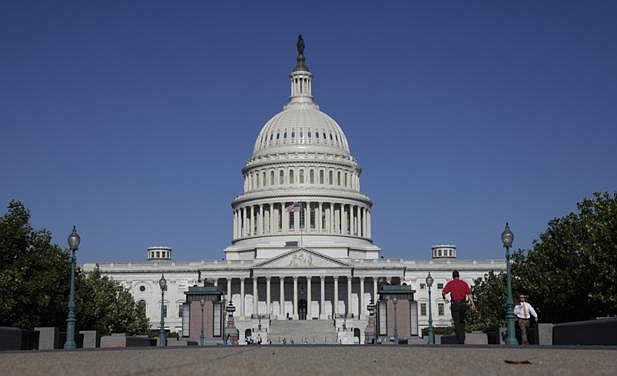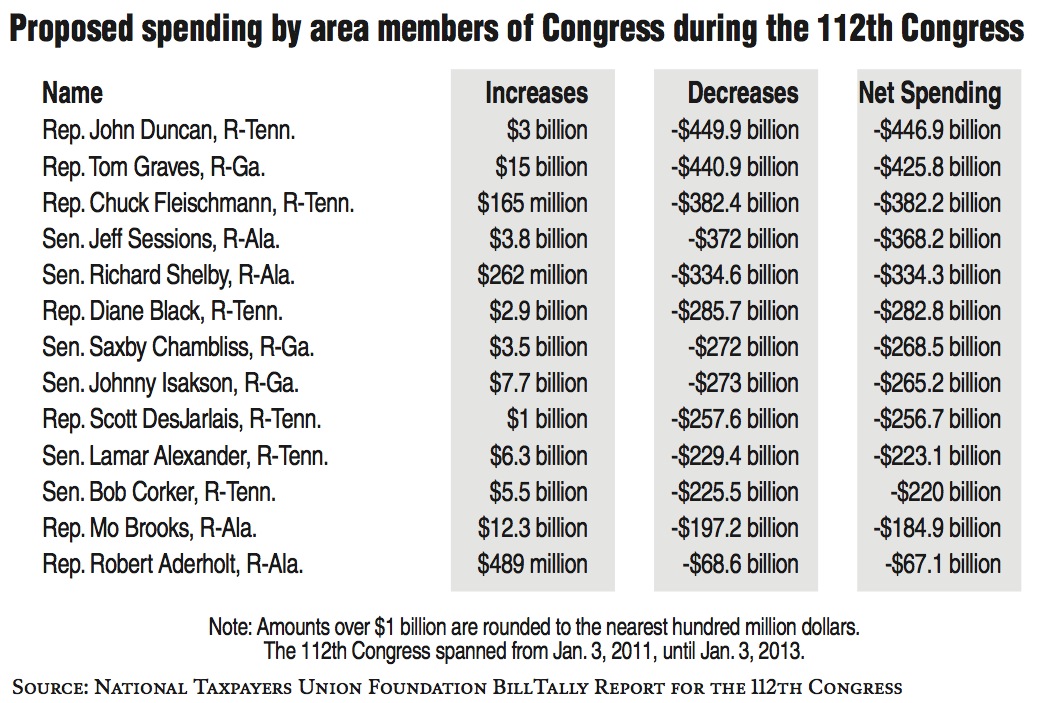In recent years, taxpayers in our region have made it known that we are concerned about runaway federal spending. We now expect our elected officials in Washington to spend our hard-earned dollars responsibly and to propose legislation that trims fat from the budget. Fortunately, it seems the members of Congress representing Southeast Tennessee, Northwest Georgia and Northeast Alabama heard us loud and clear.
During the recently concluded 112th Congress, the U.S. senators and congressmen from our area proposed to save more money than they sought to spend. A lot more. That is the finding of the National Taxpayers Union Foundation's BillTally report on the 112th Congress, which spanned from Jan. 3, 2011 until Jan. 3, 2013.
BillTally is NTUF's unique analysis of the costs -- and savings -- of the bills sponsored and co-sponsored by every member of Congress. The report provides taxpayers with objective, quantifiable information on what senators and representatives would like to do with the tax dollars we send to Washington.
NTUF reported that "the 112th Congress saw a sharp rise in the number of bills to reduce federal spending, with 221 introduced in the House and 127 in the Senate. This is the highest number of spending-cut bills NTUF has recorded since the 105th Congress (1997-1998) when there were 265." The amount of legislation that would increase spending dropped substantially, as well.
Republicans overwhelmingly proposed legislative agendas that would have netted a savings for taxpayers. Only seven House Republicans proposed agendas that, if adopted, would've cost more than they saved. In the Senate, NTUF found, "six Democrats and every single Republican proposed net agendas to shrink the budget."
The news wasn't all good, however. Overall, Congress proposed "a net budgetary cost of $1.3 trillion," according to NTUF. To make matters worse, much of the very best legislation intended to trim spending never saw the light of day. While bills to reduce the size of government are wonderful, they don't mean much if their sponsors can't rally the votes to pass the legislation.
In our region, Rep. John J. "Jimmy" Duncan Jr. led the way with legislative recommendations to cut federal spending. The Knoxville-area Republican sponsored bills calling for nearly $450 billion in reductions, compared to $3 billion in new spending, for a proposed net savings of $446.9 billion. Duncan's support of legislation to repeal both Obamacare and the Dodd-Frank Wall Street Reform and Consumer Protection Act, as well as his suggestions to reform the IRS contributed to his taxpayer-friendly tally.
Georgia's Tom Graves, a congressman from Gordon County, managed to recommend over $440 billion in savings. The tea party-minded Republican sponsored several pieces of legislation focused on limiting federal spending and revamping the budgeting process.
Rep. Chuck Fleischmann of Tennessee's 3rd District proposed less spending than any other member of Congress from our area, a relatively paltry $165 million. The Ooltewah resident's legislative agenda would have saved $2,318 for every dollar he proposed to spend.
Even Rep. Lamar Alexander, R-Tenn., who has become known as "Liberal Lamar" for his big spending, big government ways, sponsored legislation that would have netted a $223.1 billion reduction in federal outlays.
With lawmakers from our area sponsoring legislation intended to save tax dollars, why has federal spending continued to grow? Because for every member of Congress, such as Jimmy Duncan or Tom Graves, who is committed to shrinking the suffocating federal budget, there are people in Washington like Rep. John Conyers, D-Mich., who proposed $1.8 trillion in new spending, and Speaker of the House John Boehner, R-Ohio, who refused to sponsor a single bill that would have cut federal spending, working to increase the size and scope of government.
Our area lawmakers should be commended for their efforts to curb spending in Washington. Now if we can just get the rest of America to elect members of Congress with the same respect for our tax dollars, then cuts in federal spending might actually pass.

